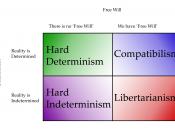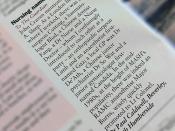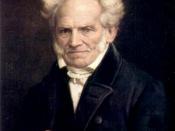A.
The apparently contrasting theories of free will and determinism has been an endless debate that has plagued philosophers for thousands of years.
There are various definitions of free will, this has led to difficulty in applying it to human behaviour. Philosophers such as Plato, Kant and Descartes have all acknowledge the existence of free will, to a varying degree. The exercise of free will consists of making choices from a genuine selection, free from coercion. As Hobbes suggests freedom means choice. It is only at the actual point of action that the final outcome will be determined.
However, this does not imply that human behaviour is uncaused or random, this would not be considered as free will in a true sense.
It must be acknowledged that there are obvious limits to free will, we could not successfully fly or breathe under water unless aids were available such as a plane or breathing apparatus.
For the majority of society our sense of moral responsibility and written laws prevent us from acting immorally, anti-socially or criminally. Although this doesn't prevent these events occuring they are considered by some as a form of punishment or deterrent.
The British legal system is based on the belief of free will, even the act of praise or blame acknowledges free will. When humans act they feel free, even emotions such as regret or remorse are considered as a sign of free will.
The contrasting theory to the free will stance is that of determinism. There are various degrees and types of deterministic theory, however, all view that all human behaviour is influenced by factors either external, internal or pre-existant. There are various types of determinism been put forward such as fatalism, religious or scientific. Philosophers such as Locke, Berkeley and Hume have all been exponents...


